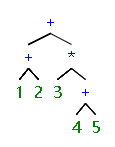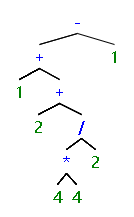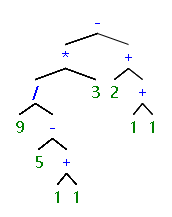根据输入的中缀表达式构造一棵等价的中缀表达式树,并通过此树计算中缀表达式的值。
通过中缀表达式树计算中缀表达式:
一、构造中缀表达式树:
①初始化操作数栈和运算符栈;
②扫描中缀表达式:
- 若扫描到操作数,压入操作数栈;
- 若扫描到界限符,遇到
(直接压入运算符栈,遇到)依次弹出运算符栈内运算符,直到弹出(; - 若扫描到运算符,依次弹出运算符栈中优先级高于或等于当前运算符的所有运算符,直到遇到
(或运算符栈空,之后再将当前运算符压入运算符栈; - 若扫描到等于号,依次弹出运算符栈中的所有运算符。
- 同时:a.每次压栈时,将操作数或运算符转化为二叉树结点形式再压栈。b.每当运算符栈中弹出运算符时,依次弹出操作数栈中的两个元素作为右操作数和左操作数,分别挂在当前运算符结点的左右孩子处,之后将当前子树作为一个操作数压入操作数栈。
二、通过后序遍历递归计算中缀表达式树。
输入样例:
1+2+3*(4+5)=
1+(2+4*4/2)-1=
((9/(5-(1+1)))*3)-(2+(1+1))=
=
输出样例:
30
10
5



#include <stdio.h>
#include <stdlib.h>
#include <stdbool.h>
#define MaxSize 10
#define ElemType BiTree
typedef struct BiTNode {
char data;
struct BiTNode *lchild, *rchild;
} BiTNode, *BiTree;
typedef struct SqStack {
ElemType data[MaxSize];
int top;
} SqStack;
BiTree BiTreeCreate(char *nodeData);
void BiTreeDestroy(BiTree *root);
BiTNode *nodeCreate(char c);
int calculate(BiTree root);
bool isLessOrEqual(char c1, char c2);
/*为简化代码,所有的栈操作都不作出错检查*/
void StackInit(SqStack *stack);
bool StackEmpty(SqStack stack);
void StackPush(SqStack *stack, ElemType e);
ElemType StackPop(SqStack *stack);
ElemType StackGetTop(SqStack stack);
int main() {
char str[MaxSize] = "";
while (scanf("%[^\n]%*c", str) && str[0] != '=') {
BiTree T = NULL;
T = BiTreeCreate(str);
printf("%d\n", calculate(T));
BiTreeDestroy(&T);
}
return 0;
}
/**
* 根据中序表达式构造二叉表达式树
*/
BiTree BiTreeCreate(char *nodeData) {
SqStack numStack;//操作数栈
SqStack opStack;//运算符栈
BiTNode *op;//用于暂存出栈的运算符
StackInit(&numStack);
StackInit(&opStack);
for (int i = 0; nodeData[i] != 0; i++) {
if (nodeData[i] >= 48 && nodeData[i] <= 57) {
/*当前结点是操作数,直接压操作数栈*/
StackPush(&numStack, nodeCreate(nodeData[i]));
} else if (nodeData[i] == '+' || nodeData[i] == '-' || nodeData[i] == '*' || nodeData[i] == '/') {
if (!StackEmpty(opStack)) {
op = StackGetTop(opStack);
if (isLessOrEqual(nodeData[i], op->data)) {
/*当前运算符优先级低于或等于栈顶运算符,将栈顶运算符出栈并运算*/
op = StackPop(&opStack);
/*将左、右操作数挂在左、右孩子位置上的过程就相当于运算*/
op->rchild = StackPop(&numStack);
op->lchild = StackPop(&numStack);
/*运算结果相当于一个操作数*/
StackPush(&numStack, op);
}
}
StackPush(&opStack, nodeCreate(nodeData[i]));
} else if (nodeData[i] == '(') {
/*左括号直接压栈*/
StackPush(&opStack, nodeCreate(nodeData[i]));
} else if (nodeData[i] == ')') {
/*如果遇到右括号,运算符栈一直出栈并运算,直到左括号出栈*/
while (1) {
op = StackPop(&opStack);
if (op->data != '(') {
op->rchild = StackPop(&numStack);
op->lchild = StackPop(&numStack);
StackPush(&numStack, op);
} else {
break;
}
}
} else {
/*遇到等号将栈中剩余运算符出栈运算,并将结果返回*/
while (!StackEmpty(opStack)) {
op = StackPop(&opStack);
op->rchild = StackPop(&numStack);
op->lchild = StackPop(&numStack);
StackPush(&numStack, op);
}
return op;
}
}
}
/**
* 释放二叉树内存空间
*/
void BiTreeDestroy(BiTree *root) {
if (*root) {
BiTreeDestroy(&(*root)->lchild);
BiTreeDestroy(&(*root)->rchild);
free(*root);
*root = NULL;
}
}
/**
* 将输入数据转化为二叉树结点
*/
BiTNode *nodeCreate(char c) {
BiTNode *newNode = (BiTNode *) malloc(sizeof(BiTNode));
newNode->data = c;
newNode->lchild = newNode->rchild = NULL;
return newNode;
}
/**
* 通过表达式树进行计算
*/
int calculate(BiTree root) {
if (root) {
switch (root->data) {
case '+':
return calculate(root->lchild) + calculate(root->rchild);
case '-':
return calculate(root->lchild) - calculate(root->rchild);
case '*':
return calculate(root->lchild) * calculate(root->rchild);
case '/':
return calculate(root->lchild) / calculate(root->rchild);
default:
return root->data - 48;
}
}
}
/**
* 判断c1的优先级是否小于c2
*/
bool isLessOrEqual(char c1, char c2) {
int priority1 = 1, priority2 = 1;
if (c1 == '(') {
priority1 = 0;
} else if (c1 == '*' || c1 == '/') {
priority1 = 2;
}
if (c2 == '(') {
priority2 = 0;
} else if (c2 == '*' || c2 == '/') {
priority2 = 2;
}
return priority1 <= priority2;
}
/**
* 初始化栈
*/
void StackInit(SqStack *stack) {
stack->top = -1;
}
/**
* 判栈空
*/
bool StackEmpty(SqStack stack) {
return (stack.top == -1) ? true : false;
}
/**
* 入栈
*/
void StackPush(SqStack *stack, ElemType e) {
stack->data[++stack->top] = e;
}
/**
* 出栈
*/
ElemType StackPop(SqStack *stack) {
return stack->data[stack->top--];
}
/**
* 取栈顶元素但不出栈
*/
ElemType StackGetTop(SqStack stack) {
return stack.data[stack.top];
}